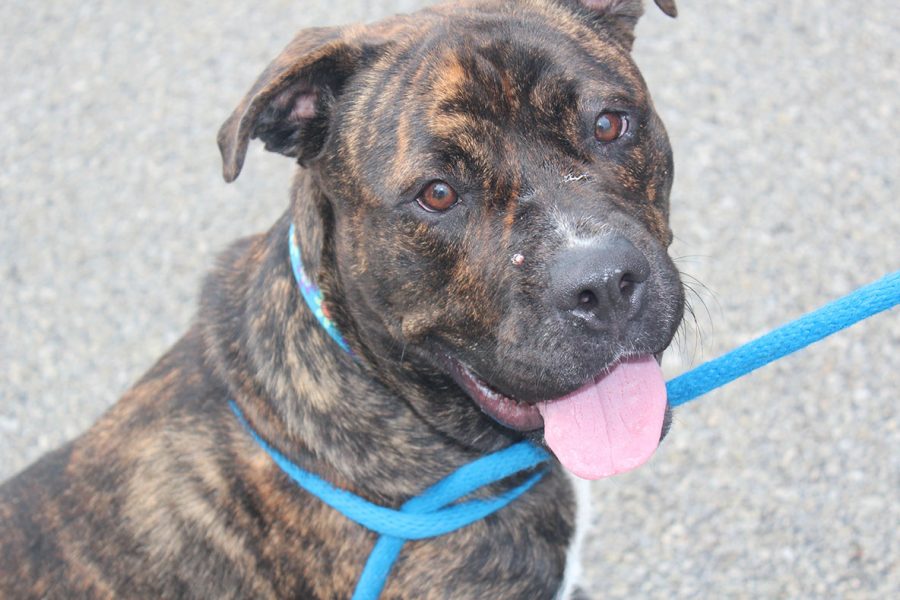More pity, less bull
Photo by Photo by M. Thomas
Izusa is a one year old female pitt bull/mastiff mix. She was recently adopted from the Humane Society for Hamilton County.
September 27, 2016
The beast displays a disgusting snarl. It violently kicks away the dirt beneath its feet. Spitting and shaking from a rage-induced adrenaline, it furrows its eyebrows and tenses its muscles, ready to strike. This is what the image of the beast, a rare breed known as the pit-bull-owner, generally looks like as it prepares its victim, the pit bull, for a bloody and unsightly scene. This scene being the infamous dog fight. The Hamilton County Humane Society provides a pit bull education program for these beasts that are in need of some behavioral training along with a reminder of their humanity.
It is humiliating for the human race that negative stereotypes about pit bulls still exist. This stereotype is part of the reason why places like the Hamilton County Humane Society find themselves overflowing with dogs, many of them, pit bulls. The discrimination against this breed is no different than the discrimination we’ve seen against various ethnicities throughout history. The pit bull has fallen prey to the notorious reign of The Stereotype. Pit bulls, just like every other canine variety, are primarily a reflection of their owner, according to Stanley Coren from Psychology Today.
Junior Megan McCabe adopted her pit bull from the Hamilton County Humane Society. McCabe has experienced undeniable encounters of pit bull prejudice against her dog, Kari.
“Some people assume because she is a pit bull she is going to be aggressive,” McCabe said. “Some will even make us put her in her crate because they are afraid of her.”
Because Kari is a pit bull, she faces an unnecessary degree of isolation compared to the amount that most other breeds will experience.
Kari had never been trained to fight, a popular stereotype attributed to the pit bull breeds reason for aggression. She was found in a street, abandoned. Despite this traumatic experience, McCabe says Kari continues to be a calm, lovable and sweet dog.
Not only are most pit bulls inherently non-violent, they are exceptionally forgiving according to the Pit Bull Awareness Coalition. The American Temperament Testing Society (ATTS) claimed that pit bulls had an above average passing score of 83 percent, better than the golden retriever, when it came to stability, aggression, friendliness and several other traits. Based off of the statistics from ATTS, the next-door neighbor’s high-pitched Pomeranian is probably more of a nuisance than most pit bulls ever could be.
The answer – to almost all the questions posed by uneducated observers – is “no.”
No, Petfinder explains that the pit bull does not have a locking jaw. No, according to Dogster, banning pit bulls will not make communities much safer. ‘Once a fighting dog, always a fighting dog’ is false; this was disproved by the Michael Vick case where 49 out of 50 dogs saved from a fighting ring were rehabilitated. The Real Pit Bull website provides evidence that most pit bulls do not turn on their owners, and explains that dogs in general are not born with an innate conscience of good or evil that would allow them to devise against their masters.
It is not the jowls of the pit bull that one should fear, but that of the human owner.
Read more about the Humane Society in The 7.6 and Gas Chamber Euthanasia.


